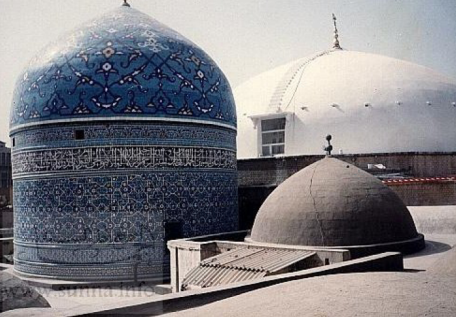Category Archives: Spirituality
The Most Beautiful Names of Allah: Ar-Rahmaanu Ar-Raheemu
Definitions:
Awrad – s. Wird — A regimen performed daily. Awrad may be performed for life. Muslims and non-Muslim alike may read this.
Wazaif – s. Wazeefah — A spiritual exercise that is read for specific number of days. One should complete the days and not miss any days unless there is an excuse. This should be perfomed in Wudu and unless specified one should also be in a state of major ritual pourity (ghusl).
Read Durood Shareef 11 times before and after each Wazeefah.
The Wazaif and Awrad:
Wazeefah 1: For those seeking Employment, Business Improvement, Peace of Mind, and Stress Alleviation
Read Ar-Rahmaan Ar-Raheemu 1100 times daily after Fajr (morning) prayers for 40 days. Could be perfomed without ghusl. There is no harm in performing wudu (even when one is in menstruation).
Wazeefah 2: For Mental Health, Stress Alleviation, Freedom from Anxiety
Read Ar-Rahmaan Ar-Raheemu 190 times and blow on your heart. Read daily after Fajr (morning) and after Isha (late night) prayers for 40 days. Could be perfomed without ghusl. There is no harm in performing wudu (even when one is in menstruation).
Wird 1: For a Clear Mind and Memory Improvement
Read Ar-Rahmaan Ar-Raheemu 100 times after 5 daily prayers daily.
These Waza’if and Awrad do not require specific permission to begin. This posting is the permission.
Virtues of the Sacred Month of Rajab
The following information has been excerpted from Al-Ghunya li-Taalibi Tareeq al-Haqq by Hazrat Shaykh Abdul Qadir Jilani (may Allah be pleased with him); translated from the Arabic by Haaji Muhtar Holland into Sufficient Provision for Seekers of the Path of Truth. (Al-Baz Publishing, Inc., Florida, 1997)Shaykh Abdul Qadir Jilani (may Allah be pleased with him) is the Sultan-ul-Awliya, i.e. Crown of the Saints and most erudite scholar of the Islamic tradition, and the fountainhead of the Qadri Spiritual Order. He was born in the Iranian district of Gilan, south of the Caspian Sea, in 470 Hijri (1077-8 CE). Having lived a life of extreme piety, sacrifice, service, and devotion to Allah Almighty and His Messenger , he passed onto the Realm of Divine Beatitude on the 11th of Rabi-uth-Thani, 561 Hijri (1166 CE). He rests in the city of Baghdad, Iraq. His blessed mausoleum is a place of pious visitation from devotees around the world.
The intent of this brief document is to bring to the attention of our readers the great spiritual benefits of these blessed nights and days, and to encourage them to derive these benefits by practicing the prescribed acts of worship.
We welcome your feedback and comments.
Thank You.
IECRC Staff
Rajab: What to Read on the 27th Day
 “Whenever the twenty-seventh of Rajab came around, Abdullah ibn Abbas radi Allahu anhuma would start the day as a mu’takif [i.e. someone who follows the practice called i’tikaf, meaning withdrawal into a state of seclusion in order to concentrate on religious devotions, especially while fasting]. He would devote the whole morning to prayer, upto and including the obligatory ritual prayer at noon [Dhuhr]. After performing the noon prayer, he would stroll about for a little while to stretch his legs, then he would perform an extra salat-prayer consisting of four cycles. In each cycle [rak’a], he would recite Surah Al-Fatiha one time only, then Surah Al-Falaq & Surah An-Naas [Al-Mu’awwidhataan], also one time only, then Surah Al-Qadr [#97] three times, and then Surah Al-Ikhlaas fifty times. He would then devote himself to continuous supplication [du’a], until it was time to perform the obligatory late-afternoon ritual prayer (‘Asr). ‘This,’ he used to say, ‘is exactly what Allah’s Messenger sallallaahu alayhi wa sallam always did on this particular day.'”
May Allah Ta’ala accept our ibaadaat bi Waseelatil Habeeb sal Allahu alayhi wa Aalihi wa sallam. Aameen.










